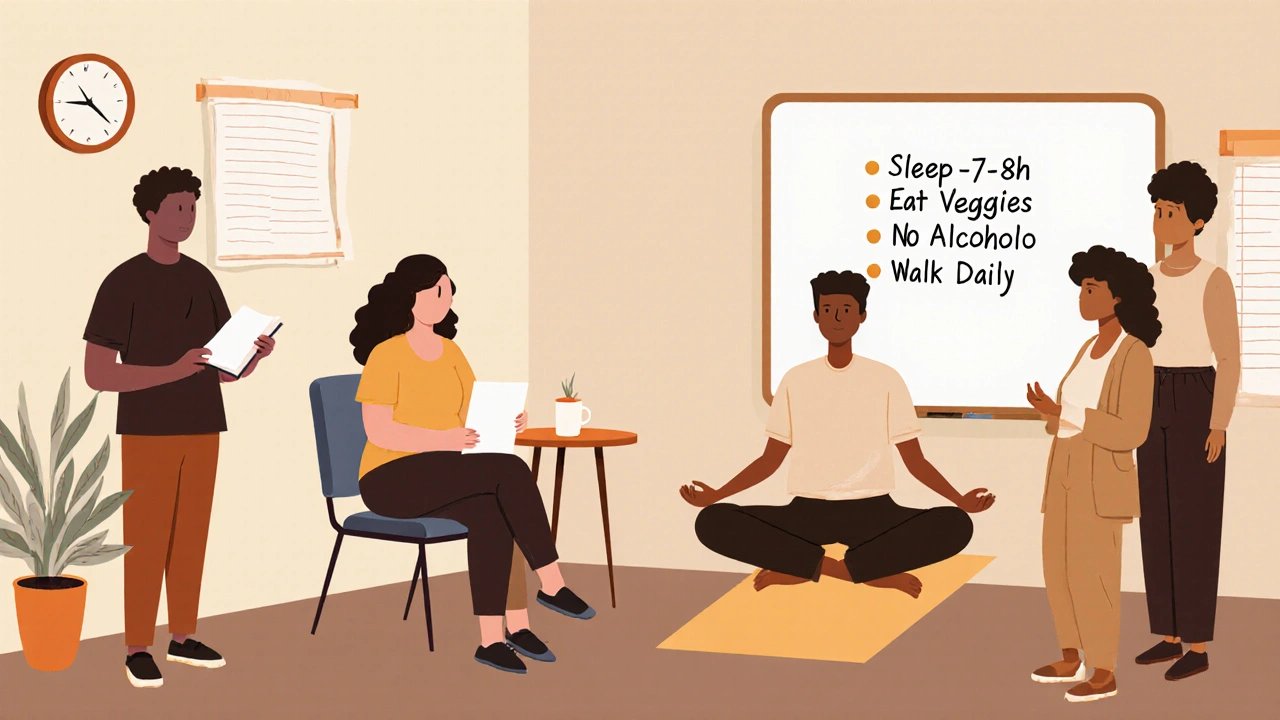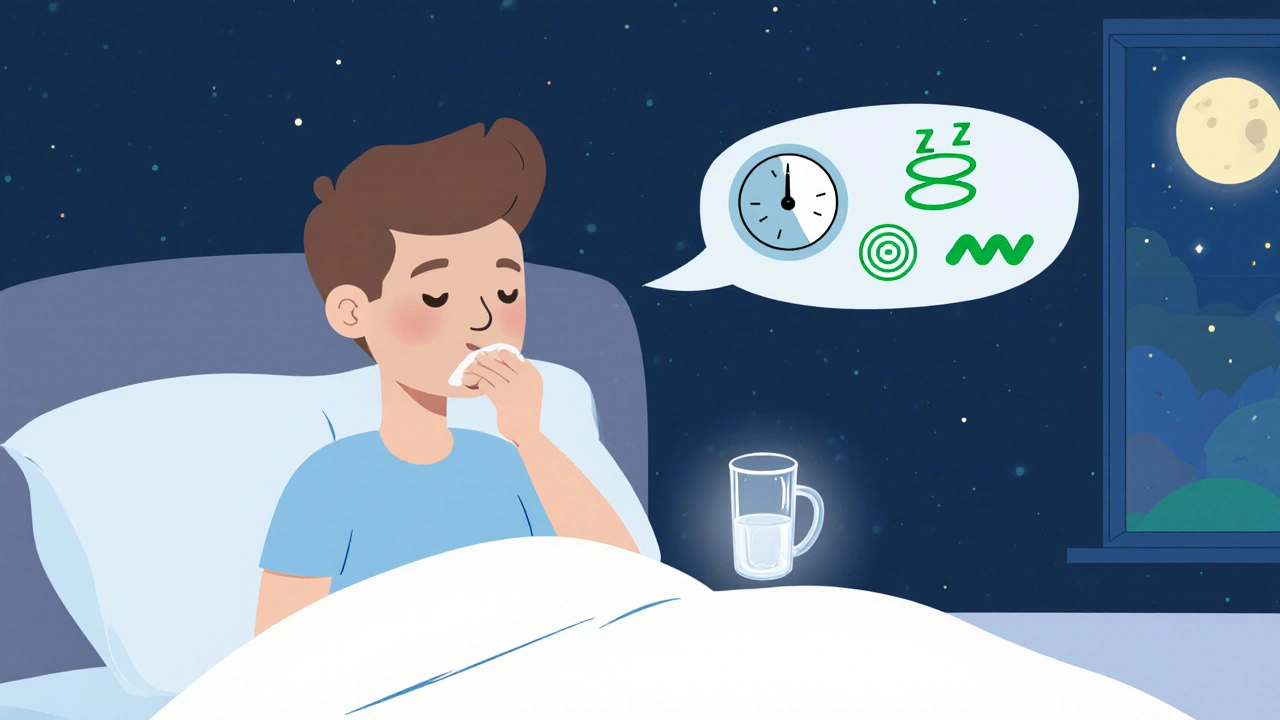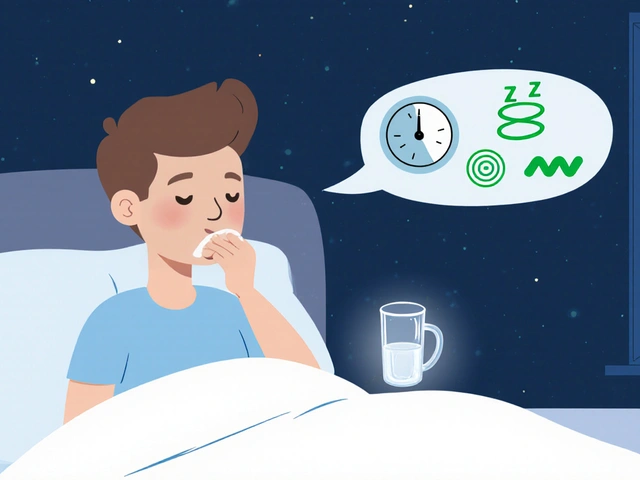Ziprasidone is an antipsychotic medication used to treat schizophrenia and bipolar disorder. It works by balancing brain chemicals like dopamine and serotonin. But like all medications, it doesn’t come without risks. Many people start ziprasidone hoping for relief from hallucinations, mood swings, or paranoia-only to be hit with side effects that make them question whether the trade-off is worth it.
Common Side Effects of Ziprasidone
Not everyone gets side effects, but a large number do. The most frequent ones include drowsiness, dizziness, nausea, and constipation. These usually show up in the first few weeks and often fade as your body adjusts. But some side effects stick around longer-or get worse.
One of the biggest concerns is ziprasidone’s effect on heart rhythm. It can prolong the QT interval, which increases the risk of a rare but dangerous heart rhythm called torsades de pointes. This is why doctors check your ECG before and after starting the drug, especially if you have a history of heart problems or take other medications that affect your heart.
Weight gain is less common with ziprasidone than with other antipsychotics like olanzapine or clozapine, but it still happens. Some people gain 2-5 kg in the first six months. Blood sugar levels can also rise, particularly in those already at risk for type 2 diabetes. Regular blood tests for glucose and cholesterol are recommended every three to six months.
Another issue is movement-related side effects. About 1 in 5 people experience muscle stiffness, tremors, or restlessness-signs of extrapyramidal symptoms (EPS). These can feel like your body is fighting you. Akathisia, the feeling that you can’t sit still, is especially distressing and often mistaken for anxiety.
When to Call Your Doctor
Not every side effect needs emergency care, but some do. Call your doctor right away if you notice:
- Fast or irregular heartbeat, especially with dizziness or fainting
- High fever, stiff muscles, confusion, or sweating-signs of neuroleptic malignant syndrome (NMS)
- Sudden difficulty swallowing, slurred speech, or uncontrollable tongue or jaw movements
- Severe dizziness or fainting when standing up
NMS is rare but life-threatening. It happens in fewer than 1 in 1,000 people on antipsychotics, but if it happens, you need hospital treatment fast. Don’t wait. If you feel like your body is shutting down, go to the emergency room.
Managing Drowsiness and Dizziness
Drowsiness is one of the most common reasons people stop taking ziprasidone. It can make driving, working, or even getting through the day feel impossible.
Start with timing. Take your dose at night if your doctor approves it. Many people find that taking ziprasidone before bed reduces daytime sleepiness. If you’re still tired in the morning, don’t reach for caffeine to compensate-it can make heart rhythm issues worse. Instead, try a short walk after breakfast. Movement helps wake up your brain without overloading your system.
Dizziness often comes from low blood pressure, especially when standing up too fast. This is called orthostatic hypotension. To manage it, stand up slowly. Wait a few seconds after sitting or lying down before standing. Drink plenty of water throughout the day. Dehydration makes low blood pressure worse. Avoid alcohol-it lowers blood pressure even more.
Dealing with Nausea and Digestive Issues
Nausea is common in the first week. It’s usually mild, but it can be enough to make you skip doses. Don’t stop taking ziprasidone without talking to your doctor. Instead, try taking it with food. Even a small snack like crackers or toast can make a big difference.
If nausea lasts longer than two weeks, ask about anti-nausea meds like metoclopramide or ondansetron. These aren’t always needed, but they can help you stick with the treatment. Constipation is another issue. Eat more fiber-oats, beans, apples, broccoli. Drink at least 2 liters of water daily. If that doesn’t help, a gentle stool softener like docusate sodium is safe to use short-term.
Handling Movement Problems and Restlessness
Extrapyramidal symptoms (EPS) can be scary. Your muscles might feel tight, your hands might shake, or you might feel an urgent need to pace. These aren’t signs you’re getting worse-they’re side effects of the drug.
The first step is telling your doctor. They might lower your dose slightly. Sometimes, even a 10% reduction makes a huge difference. If that doesn’t help, they may prescribe a short course of benztropine or diphenhydramine. These help reverse the muscle effects quickly.
Akathisia is tricky because it feels like anxiety. People often think they need more medication to calm down-but adding more antipsychotics makes it worse. Instead, try light exercise: walking, yoga, or swimming. Studies show regular physical activity reduces akathisia symptoms by up to 40% in some patients. Avoid caffeine and stimulants-they make the restlessness worse.
Monitoring Heart Health and Metabolic Changes
Ziprasidone doesn’t cause as much weight gain as other antipsychotics, but it still affects your metabolism. Your doctor should check your weight, blood sugar, and cholesterol every three months when you first start, then every six months after that.
Track your own numbers too. Keep a simple log: weight once a week, waist measurement once a month. If your waistline grows by more than 5 cm in six months, talk to your doctor. It’s not just about appearance-it’s about heart risk.
For heart rhythm, avoid medications that interact with ziprasidone. Common ones include certain antibiotics (like clarithromycin), antidepressants (like citalopram), and antifungals (like fluconazole). Always tell any new doctor or pharmacist you’re on ziprasidone before they prescribe anything else.

When to Consider Alternatives
Not everyone responds to ziprasidone. If side effects are too severe and don’t improve after 6-8 weeks, it’s time to talk about alternatives. Other antipsychotics like aripiprazole or lurasidone have lower risks for heart rhythm issues and movement problems. Quetiapine might be better if drowsiness isn’t a problem.
Switching meds isn’t easy. You can’t just stop ziprasidone cold. Your doctor will slowly reduce your dose over weeks while introducing the new one. This prevents withdrawal symptoms like rebound psychosis or severe nausea.
Some people find that combining medication with therapy helps reduce the dose needed. Cognitive behavioral therapy (CBT) for psychosis or mood disorders can improve outcomes and let you stay on a lower, better-tolerated dose of ziprasidone.
Support Systems and Daily Habits
Managing side effects isn’t just about pills. It’s about your whole life. Sleep, diet, stress, and social support all matter.
Try to sleep 7-8 hours a night. Poor sleep makes dizziness, mood swings, and even movement problems worse. Use a sleep tracker if you need to. Avoid screens an hour before bed. Blue light messes with melatonin, which you need to feel sleepy.
Eating well helps too. A diet high in vegetables, lean protein, and whole grains supports your brain and body as they adjust to the medication. Avoid sugary snacks-they cause blood sugar spikes and crashes, which can mimic or worsen mood symptoms.
Don’t isolate yourself. Join a support group-online or in person. Talking to others who’ve been through the same thing reduces shame and helps you feel less alone. Many hospitals offer free peer-led groups for people on antipsychotics.
Final Thoughts: It’s a Process, Not a Quick Fix
Ziprasidone can be life-changing-for some, it’s the first medication that actually works. But it’s not a magic bullet. Side effects are real, and they require active management. The goal isn’t to eliminate every discomfort-it’s to find a balance where the benefits outweigh the downsides.
Keep a journal. Write down how you feel each day: energy levels, mood, sleep, side effects. Bring it to your appointments. It helps your doctor see patterns you might miss.
Be patient. It takes time for your body to adapt. Most side effects improve within 4-8 weeks. If they don’t, speak up. There are options. You don’t have to suffer in silence.
Can ziprasidone cause weight gain?
Yes, but less than most other antipsychotics. About 10-15% of people gain more than 5% of their body weight in the first six months. This is lower than with olanzapine (up to 40%) or clozapine (up to 50%). Monitoring diet, exercise, and regular blood tests can help manage this risk.
Is it safe to drink alcohol while taking ziprasidone?
No. Alcohol increases drowsiness, dizziness, and the risk of low blood pressure. It can also worsen heart rhythm problems caused by ziprasidone. Even one drink can make you feel unsteady or increase the chance of fainting. It’s best to avoid alcohol completely while on this medication.
How long do ziprasidone side effects last?
Most common side effects like drowsiness, nausea, and dizziness improve within 2-6 weeks as your body adjusts. Movement-related issues like tremors or restlessness may take longer-up to 8 weeks. If side effects persist beyond 8 weeks or get worse, talk to your doctor. You may need a dose adjustment or a different medication.
Can ziprasidone cause depression or worsen mood?
Ziprasidone is used to treat mood disorders, but in rare cases, it can cause or worsen depression, especially in the first few weeks. If you feel more hopeless, withdrawn, or have thoughts of self-harm, contact your doctor immediately. This is not common, but it’s serious enough to require urgent attention.
What should I do if I miss a dose of ziprasidone?
If you miss a dose, take it as soon as you remember-unless it’s close to your next scheduled dose. Never double up. Missing doses can cause withdrawal symptoms like nausea, vomiting, or anxiety. If you miss two or more doses in a row, call your doctor before restarting. Stopping suddenly can trigger psychosis or severe movement problems.



Mary Follero
November 19, 2025 AT 04:34I started ziprasidone last year and honestly? The drowsiness was brutal at first. I thought I was gonna quit until my doc said to take it at night. Game changer. Now I sleep like a rock and wake up feeling human. Also, walking 20 mins after breakfast kills the brain fog. No caffeine, no crash. Just movement. Trust me, it works.
And yes, the nausea faded after two weeks. Took it with a spoonful of peanut butter - weird, but it stuck.
You’re not broken. Your body’s just learning.
Will Phillips
November 20, 2025 AT 08:57They don't tell you this but ziprasidone is just another pharma scam to keep you dependent. They say 'less weight gain' but what about the QT prolongation? That's a death sentence waiting to happen. I know a guy who got torsades after 3 months. They buried it in the fine print. Doctors don't care. They get paid per script. Wake up people.
And don't even get me started on the 'support groups' - they're just cults with free coffee.
Arun Mohan
November 20, 2025 AT 16:03How quaint. You're treating a neurological condition like it's a yoga retreat. I've seen patients on ziprasidone in Mumbai - the side effects are brutal, and your 'walk after breakfast' advice is laughably naive. No access to clean water, no fiber-rich diets, no 7-hour sleep. This is a Western privilege post.
And you call it 'management'? It's survival. With no safety net.
Also, why no mention of the caste-based stigma in non-Western countries? No one talks about that. Of course you wouldn't.
Tyrone Luton
November 22, 2025 AT 12:30There’s a deeper truth here, isn’t there? We’re not just managing side effects - we’re negotiating with our own biology. Ziprasidone doesn’t just alter dopamine - it alters identity. The drowsiness? That’s the ego quieting down. The akathisia? The soul screaming for stillness.
But society wants a pill to fix a soul problem. We’ve lost the art of suffering. We want to medicate meaning away.
Maybe the real side effect isn’t QT prolongation - it’s forgetting how to be human without chemical scaffolding.
Jeff Moeller
November 22, 2025 AT 21:17Just take it at night. Eat food. Drink water. Don’t drink alcohol. If it sucks, talk to your doctor. Simple. No philosophy. No conspiracy. Just facts. People overcomplicate everything. Medication isn’t magic. It’s chemistry. Deal with it.
Herbert Scheffknecht
November 23, 2025 AT 19:09I’ve been on ziprasidone for 4 years. The first six months were hell - tremors, dizziness, feeling like my bones were made of glass. But here’s what nobody tells you: the worst part isn’t the side effects. It’s the guilt. The shame. The fear that you’re weak because you need this.
I started journaling. Not to track symptoms - to track moments when I felt like myself again. A laugh with my niece. The smell of rain. A quiet morning without panic.
It’s not about eliminating side effects. It’s about reclaiming the small joys that the illness stole. That’s the real win.
And yes - I still take it. Not because I have to. Because I choose to. For those quiet moments.
Jessica Engelhardt
November 24, 2025 AT 15:45Yeah right. 'Less weight gain' - sure, if you're white and have a personal chef. Try being a single mom on food stamps trying to eat 'fiber-rich meals' while your kid's screaming and the power got shut off again. And 'regular blood tests'? You mean the ones that cost $200 and your insurance denies? This whole post is a luxury ad for rich people who don't know what real struggle looks like.
Also - who wrote this? A pharma rep in a suit? I'm not buying it.
Martin Rodrigue
November 25, 2025 AT 12:35While the content provided is generally accurate and clinically sound, I must note that the recommendation to use docusate sodium for constipation lacks sufficient evidence regarding long-term efficacy in antipsychotic-induced gastrointestinal hypomotility. Furthermore, the assertion that walking reduces akathisia by 40% is derived from a single small-scale pilot study (n=23) with no control group. A more rigorous meta-analysis is warranted before such claims are generalized to clinical practice.
Additionally, the omission of pharmacokinetic interactions with CYP3A4 inhibitors is incomplete. Fluconazole is not the only significant inhibitor - voriconazole and grapefruit juice are equally consequential.
Sherri Naslund
November 25, 2025 AT 13:21you ever notice how they always say 'talk to your doctor' like that's some magic wand? what if your doctor is a lazy ass who only sees you for 8 minutes? what if they don't even know what akathisia is? i had to google it myself. and then they give you benztropine which makes you feel like a zombie on a trampoline.
also why is everyone always talking about 'diet and exercise' like we're not already exhausted? i'm not lazy. i'm medicated. and my body hates me right now.
and don't even get me started on 'support groups' - i went to one and some lady cried for 20 minutes about her cat. nobody talked about the meds.
Ashley Miller
November 26, 2025 AT 01:38Ziprasidone is just a cover. The real goal is to make you docile. They don't want you thinking too much. That's why they give you drowsiness - to keep you quiet. The heart stuff? That's just collateral damage. Watch the news - every time someone gets a new psychiatric drug, there's a spike in 'unexplained deaths'. Coincidence? I think not.
They're testing this on us. And the 'regular blood tests'? They're tracking your DNA. Don't be fooled.
Lauren Hale
November 26, 2025 AT 09:56For anyone reading this and feeling alone - you’re not. I’ve been on ziprasidone for 7 years. I’ve had the tremors, the dizziness, the nights where I cried because I just wanted to feel normal.
But I also had the first morning in 3 years where I woke up and didn’t feel like my body was made of lead. I had a coffee with my sister and actually listened to her. No meds, no numbness - just us.
It took time. It took adjustments. It took me screaming at my doctor until they listened. But it was worth it.
You don’t have to suffer in silence. You just have to keep showing up. Even if it’s just to take the pill. Even if it’s just to breathe.
I’m still here. And so can you.
Greg Knight
November 26, 2025 AT 22:46Let me tell you something - I’ve been a caregiver for my brother on ziprasidone for 5 years. I’ve held his hair back when he threw up. I’ve sat with him when he couldn’t sit still. I’ve driven him to three different ERs because he thought his heart was stopping.
But I’ve also seen him laugh at a dumb YouTube video. I’ve watched him plant tomatoes in our backyard. I’ve heard him say, 'I think I’m gonna be okay.'
Side effects? Yes. They’re real. They suck. But they’re not the whole story.
Don’t focus on the bad days. Focus on the moments where he looked at me and said, 'Thanks for not giving up on me.' That’s the real win.
And if you’re the one taking it? You’re not a burden. You’re a warrior. Keep going.
rachna jafri
November 27, 2025 AT 09:05They say 'ziprasidone is better than olanzapine' - yeah, right. Like calling a chainsaw better than a hammer because it doesn't cut your finger off. Both will kill you. I’ve seen people on this stuff turn into zombies. No emotion. No joy. Just walking meat with a heartbeat.
And the 'metabolic monitoring'? What about the food deserts? What about the people who can’t afford to eat kale? You think a banana and some oatmeal fixes schizophrenia? That’s rich people logic.
They don’t want you healed. They want you managed. And you’re all just sheep nodding along.
darnell hunter
November 28, 2025 AT 07:40It is not recommended to consume alcohol concurrently with ziprasidone due to the potential for additive central nervous system depression. This is clearly documented in the FDA-approved prescribing information. Furthermore, the risk of orthostatic hypotension is amplified in elderly patients and those with preexisting cardiovascular conditions. Adherence to scheduled ECG monitoring is mandatory per clinical guidelines. Failure to comply constitutes a deviation from standard of care.